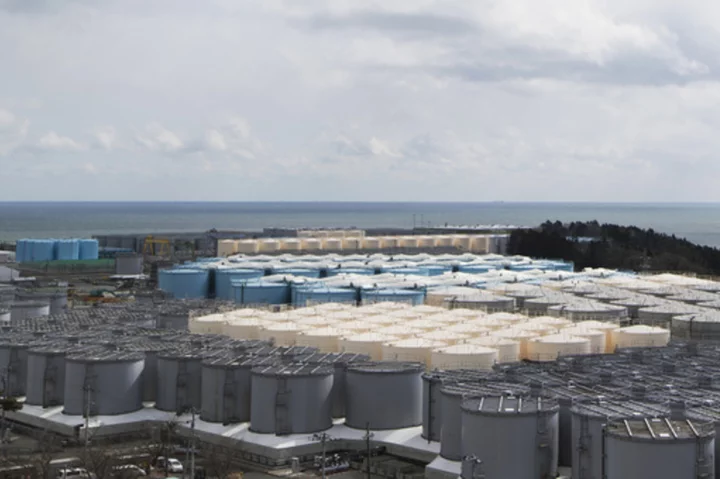Officials from Japan and South Korea eyed a potential visit by South Korean experts to the Fukushima nuclear plant before it begins the controversial release of treated but radioactive water to sea. It's one of their major sticking points between the two sides that are quickly thawing long-strained ties.
Discussions were to take place later Friday, and the Japanese government was expected to give updates on the status of the tsunami-wrecked Fukushima Daiichi nuclear plant, which is preparing for a release of the water, saying it's an unavoidable step to move its decommissioning process forward.
The government and the plant's operator, Tokyo Electric Power Company Holdings, say the release will begin between spring and summer and take decades to finish.
A massive earthquake and tsunami in 2011 destroyed the Fukushima Daiichi plant’s cooling systems, causing three reactors to melt and release large amounts of radiation. Water used to cool the three damaged reactor cores, which remain highly radioactive, leaked into the basements of the reactor buildings and was collected, treated and stored in about 1,000 tanks that now cover much of the plant.
The government and TEPCO say the tanks must be removed so that facilities can be built for the plant’s decommissioning, while minimizing risks of leaks in case of another major disaster. The tanks are expected to reach their capacity of 1.37 million tons in spring 2024.
Japanese Prime Minister Fumio Kishida, during his May 7-8 visit to Seoul for a summit with South Korean President Yoon Suk Yeol, announced that Japan will receive a team of experts to visit the plant later in May to address South Korea's concerns in a show of his enthusiasm to further improve relations.
Seoul wants to send some 20 government experts to visit Fukushima Daiichi plant May 23-24, although the group's size would be determined after talks with Japan, according to South Korean officials. Japan was reluctant to accept private experts, saying it's a government-to-government matter.
Japan is expected to give them a tour — not a safety inspection — of the plant.
Chief Cabinet Secretary Hirokazu Matsuno said Thursday the visit would not affect the timing of a planned release of the water and that Japan continues to give explanation about safety measures to gain understanding.
Japanese officials say the water will be safely filtered to below releasable levels by international standards and further diluted by large amounts of seawater before release, making it unharmful to human health or to marine life.
The plan has faced fierce protests from local fishing communities that are concerned about safety and reputational damage. Neighboring countries, including South Korea, China and the Pacific Island nations, have also raised safety concerns.
Some scientists say the impact of long-term, low-dose exposure to tritium and other radionuclides on the environment and humans is still unknown and the release should be delayed.
Japan has been assisted by the International Atomic Energy Agency to ensure credibility and transparency.
Historical disputes have strained ties between Tokyo and Seoul — most recently over compensation of wartime Korean forced laborers during Japan's 1910-1945 colonization of the Korean Peninsula. But their relationship has thawed rapidly since March, when Yoon's government announced a local fund to compensate some of the former laborers. Tokyo and Seoul, under pressure from Washington, share a sense of urgency to mend ties amid growing security threats in the region.
___
Associated Press writer Kim Tong-hyung in Seoul, South Korea, contributed to this report.

